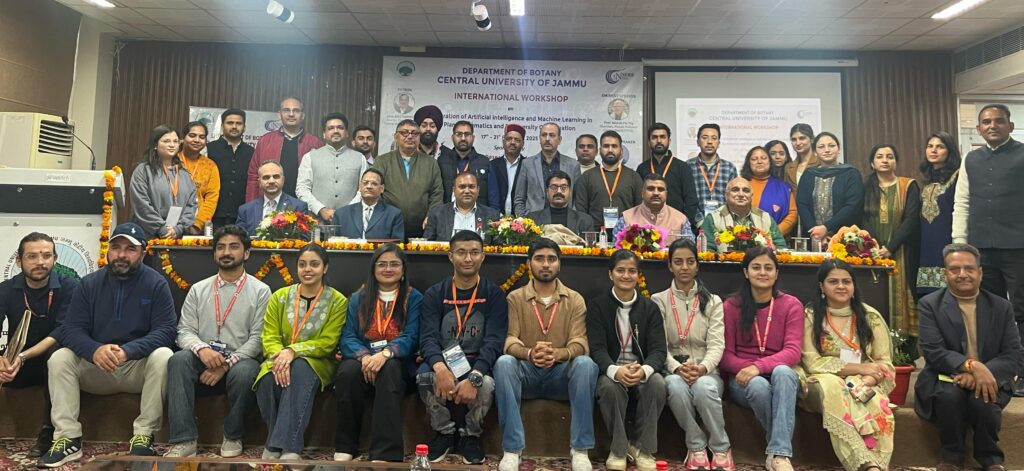International Workshop on “Artificial Intelligence and Machine Learning in Plant Systematics and Biodiversity Conservation” Commences at Central University of Jammu
Jammu, 17 Feb 2025: The five-day International Workshop on the Integration of Artificial Intelligence (AI) and Machine Learning (ML) in Plant Systematics and Biodiversity Conservation commenced today at the Department of Botany, Central University of Jammu (CUJ). The inaugural session witnessed enthusiastic participation from over a hundred scholars, students, and researchers from various institutions. The workshop serves as an interactive platform for researchers, students, and experts to explore the transformative role of AI in plant sciences. With interdisciplinary collaboration at its core, the event is expected to foster innovative research and sustainable solutions for biodiversity conservation.

The workshop was inaugurated under the visionary leadership of Prof. Sanjeev Jain, Hon’ble Vice-Chancellor, CU Jammu, whose commitment to academic excellence and sustainable development has been pivotal in supporting such interdisciplinary initiatives. Esteemed dignitaries, including Prof. Pardeep Kumar, Dean Academics, Central University of Himachal Pradesh; Prof. Yashwant Singh, Registrar, CUJ; Prof. Sunil Dhar, Dean, School of Life Sciences, CUJ; and Prof. Deepak Pathania, Professor, Department of Environmental Sciences, CUJ graced the occasion.
Prof. B.S. Bhau, Professor, Department of Botany, CUJ extended a warm welcome to the guests, emphasizing AI’s potential in plant species identification and conservation efforts. Dr. Yogesh Kumar, Head of the Department of Botany, CUJ, introduced the workshop to the audience, highlighting the pressing global environmental challenges, and emphasising the critical need for integrating AI solutions in biodiversity conservation. He also expressed gratitude to the Agriculture and Natural Resources Foundation (ANRF) for their generous financial support, which was instrumental in making this workshop possible.
The inaugural session featured thought-provoking addresses from experts in the field. Prof. Sunil Dhar highlighted the importance of AI and ML in analysing climate-driven changes in Himalayan vegetation and their applications in medical sciences. Prof. Deepak Pathania elaborated on AI’s potential to detect climate change impacts and enhance agricultural productivity through sensor-based soil and plant health monitoring. Prof. Yashwant Singh described AI as a revolutionary tool for a greener future, encouraging participants to explore collaborative research opportunities in this domain.
Prof. Pradeep Kumar, Guest of Honour delivered an engaging talk on AI’s applications in plant taxonomy, pest management, and breeding techniques. He cited examples such as QR code-based plant identification systems in botanical gardens and the “Namo Drone Didi” initiative, which empowers women in agriculture through AI-driven drone technology. Additionally, he stressed the wise use of AI, urging researchers to view it as a tool rather than a replacement for scientific expertise.
Remaining sessions of the day featured insightful talks by Prof. Manzoor Ahmad Shah, Professor, University of Kashmir, who emphasized the importance of accurate data collection in AI-based research. He discussed the role of AI in monitoring ecological interactions, particularly in Kashmir and the Himalayan ranges, and its potential in preserving fragile ecosystems. Sh. O.P. Sharma Vidhyarthi, IFS (Retd.), Former PCCF, highlighted the significance of AI in biodiversity conservation, stressing its ability to analyse vast datasets for monitoring and protecting endangered species. Dr. Arvind Selwal from CUJ, conducted a demonstration on training an AI model for Iris flower classification and explored the application of AI algorithms in precision farming.
Dr. Ashok Kumar, Organizing Secretary of the Workshop, delivered the vote of thanks during the inaugural ceremony, expressing his sincere appreciation and heartfelt welcome to all the speakers and participants for their valuable contributions. Overall, the first day of the workshop was a resounding success, with engaging discussions, thought-provoking presentations, and practical demonstrations that showcased the vast potential of AI and machine learning in plant systematics and biodiversity conservation.






